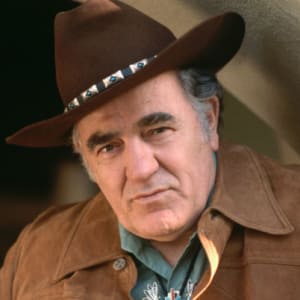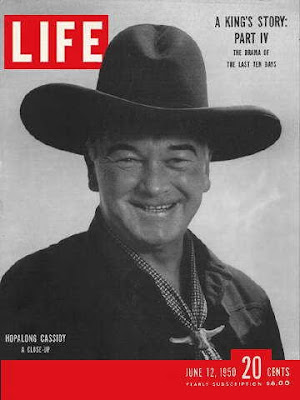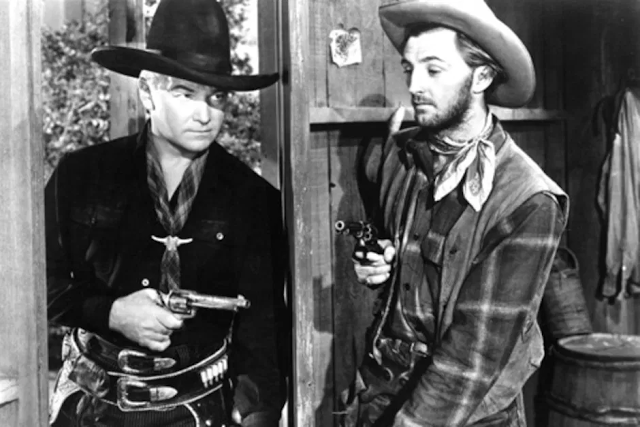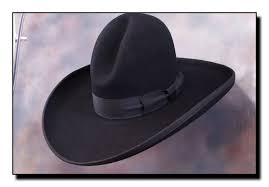
The late
Louis L'Amour has my deep, belated gratitude for taking me back to
one of my very first (and longest-lasting in my boyish imagination)
superheroes, whose twenty (or-fifty?)-gallon,
wide-brimmed black hat I covet yet today. And
I owe gratitude, too, to one of my favorite blogs, Jerry's
House of Everything,
for spurring me to the Amazon Roundup where I found The
Trail to Seven Pines
and L'Amour's three other novels featuring the black-hatted
superhero, novels I'd not known existed. I enjoyed the dickens out of
Seven
Pines,
the
first novel I’d read about my superhero since those old graphic
novels (we called them “comics” in those days), coming
close to slapping my butt and galloping on pee breaks to the toilet,
galloping like my playmates and I did back in the day when Indians
were still the bad guys in our movies and in our backyard
re-enactments.
My imagination cantered
poignantly savoring
L'Amour's tale of the
"cowboy" I wanted to be when I grew up:
a gentleman knight in
black denim with
a faithful (brilliant, actually) snowy
horse and a pair of nickel-plated, ivory-gripped, single-action
Colt. 45 revolvers in black leather holsters draped
just below the
hips and tied to my thighs (to aid in the
quick-draw shooting of
guns out of bad guys' hands).
And then...and then
crushing disappointment delivered by L'Amour's son Beau
in a note at novel's
end mentioning a feud between L'Amour and his publisher over which
Hopalong Cassidy to write about. Excuse me? Which
Hopalong Cassidy? There are more than one? No! I am too damned old
mature. My
imagination has locked onto my
Hopalong Cassidy. I will truck no other!
The
Hoppy played by William Boyd in the movies and on TV had originated
in the popular novels of Clarence Mulford, who retired in 1941. A
decade later Mulford’s publisher, Doubleday, decided it wanted more
Hoppy novels, but Mulford wasn’t interested, and passed the baton
to L’Amour, who was writing pulp magazine westerns at the time.
L’Amour wrote his four Hoppy
novels under the nom
de plume “Tex
Burns,” picked by Doubleday, Beau L’Amour tells us, but under
protest: “Dad
wanted to use Mulford’s original Hoppy, a red-haired,
hard-drinking, foulmouthed, and rather bellicose cowhand, instead of
Doubleday’s preference for the slick, heroic approach that Boyd
adopted for his films.” Lordy. Had Louis L’Amour’s desire
prevailed I might very well have grown up with an ambition aiming
somewhat beneath the slick, heroic, black-hatted, spur-jangling,
straight-shooting (with either hand) defender of truth, justice,
apple pie and American idealism that endured until I spouted my first
grown-up obscenity, which
led down the trail to
a taste for coffee, then
beer, tobacco (and
other smokables), Early
Times bourbon, and on
to several DUI citations and higher insurance premiums.
L’Amour’s reverse
disenchantment, Beau writes, led to his father’s refusal to admit
“he had ever written those last four Hopalong stories. The elder
L’Amour died in 1988, and the new editions came out four years
later, “the first time that they have ever been published with his
name on them.”
 |
| Louis L'Amour |
I haven’t read much of
L’Amour’s work, the most recent was The
Ferguson Rifle,
over twenty years ago, as research for something I was writing at the
time. I like his style—clear, no distracting literary
embellishments, believable dialogue. His opening sentence in Seven
Pines is a
get-straight-to-the-point Hemingwayesque polished gem:
“Hopalong Cassidy
stopped his white
gelding on the
bald backbone of the ridge.” The second sentence adds a tad more
description:
“No soil covered the windswept sandstone, only a few gnarled cedars
that seemed, as is their way, to draw nourishment from the very rock
itself.”
Of course, this being a Hoppy
story, the action kicks in mighty early. We’re clued to this with
the chapter-one title: “Two Dead Men.” Indeed,
riding in a sudden heavy rainstorm Hoppy and snowy Topper virtually
trip over a body on the trail. Hoppy determines the victim, altho
riddled with bullets, had been “given a chance” before being
murdered. Seeking shelter from the rain they come across a wounded
man, who’d also been shot. They gallop off to find a doctor, and by sheer coincidence meet a buckboard in which the sheriff, the doctor, and several
others are riding. Hoppy leads them to the wounded man, who’s now
dead. He’d been executed at close range with his own revolver.
Before days end Hoppy is
deeply enmeshed in a range feud between a good rancher, a bad one,
and assorted free-lance rustlers. Our superhero signs on with the
good rancher, and soon the feud bursts into all-out war. No need to guess
at the outcome, but the little twists and surprises kept me guessing,
and the narrative never faltered. This was my Hoppy, alright. Found
myself tempted dearly to search Google for 20-50-gallon black cowpoke
hats...and I still might. Still might give my butt a slap or three
and gallop to the can next time I go for a pee. Old heroes die hard,
you know. In fact, I don’t think Hoppy’ll ever die. Not that he
worried about it, if we’re to believe this conversation he held
with a fellow saddletramp as they prepare for heavy lead-slinging
exchange with some really nasty humanoid varmints:
“Lock looked at the
gunfighter curiously. ‘Hoppy, don’t you ever worry about cashin’
in? You don’t show it.’
“Hopalong shrugged. ‘I
reckon not. When it comes it will come. I don’t think about this
fate business. I just ride along, take no chances I don’t have to
take, and what
happens will happen.’”
Thanks, Jerry House! A million
thanks, for pointing me back to the trail of my innocent—albeit
misled and misunderstanding—wide-eyed yout’!



I watched Hopalong Cassidy in the afternoons after school on TV when I was a kid (and Roy Rogers, Gene Autry, and the Cisco Kid). But I did not know the character was based on novels. All this is very interesting.
ReplyDeleteDid you play "cowboys" with your friends, Tracy?" Next to Hoppy, Gene was my favorite--maybe because his name was harder to say than "Roy Rogers." When we played, everyone wanted to be Roy. I liked Cisco, but not the way I did Hoppy. Might have had something to do with the comic books--the stories were simpler.
DeleteI had forgotten, Matt, but actually I must have played cowboys when I was younger (before we had a television) because there was a Christmas photo of me at an early age in cowgirl outfit and with gun and holster. Around 10 or 11 (and up) I had a crush on Roy and his birthday was the same as mine. My husband and I have watched The Phantom Empire with Gene Autry many times. It is a 12 part serial that combines the western, musical, and science fiction genres.
DeleteThe Phantom Empire sounds fascinating. My uncle met Gene at a restaurant in Milwaukee when he was in town for a charity event. Said he was dressed in his full regalia and seemed quite self-conscious and nervous. I can imagine that for Gene, altho I can't see Bill Boyd as being anything other than the confident Hoppy he played on screen. Maybe good I didn't meet them back then, or I might have been disillusioned.
Delete